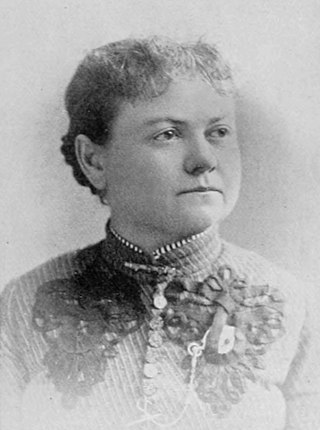
Alzina Stevens was an American labor leader, social reformer, and editor, active in Hull House in Chicago. She was one of the representative women in the order of the Knights of Labor and an ardent advocate of equal suffrage. She served on the editorial staff of the Toledo Bee and was half owner and editor of the Vanguard, an organ of the People's Party. Although her marriage to Mr. Stevens in 1876 or 1877, ended in divorce soon after, she kept her husband's surname.

Lilian Whiting was an American journalist, editor, and author of poetry and short stories. She served as literary editor of the Boston Evening Traveller (1880–1890), editor-in-chief of the Boston Budget (1890–93), and afterward, spent much of her time in Europe. Whiting was the author of The World Beautiful, From Dreamland Sent, a book of poems, A Study of the Life and Poetry of Elizabeth Barrett Browning, A Record of Kate Field, The World Beautiful in Books, Boston Days, Florence of Landor, The Outlook Beautiful, Italy, the Magic Land, Paris the Beautiful, and others.

Mildred A. Bonham was a 19th-century American travel writer from Illinois. In 1858, she married Judge Benjamin F. Bonham, later removing to Calcutta where her descriptions in the letters she wrote to the Oregon Statesman were eagerly read and highly commended. Her vivid stories clearly portrayed the beauties of that city and the social relations of the people. Bonham did some work among the women of India, and succeeded in raising US$1,000 to found a scholarship for women in one of the schools in India.

Mary Allen West was an American journalist, editor, educator, philanthropist, superintendent of schools, and temperance worker. A teacher in her early career, she served as superintendent of schools in Knox County, Illinois, being one of the first women to fill such a position in Illinois. An active supporter of the temperance movement, West served as president of the Illinois Woman's Christian Temperance Union (WCTU), and editor of the national paper, Union Signal. Her other roles within the WCTU included superintendent of the Training School for Temperance Workers, Illinois State Superintendent of Temperance in Schools of Higher Education, as well as Stockholder, Director, and Secretary of the Woman's Publication Association. She was the first president of the Illinois Woman's Press Association, a member of the Chicago Woman's Club, and director of the Protective Agency for Women and Children. West was the author of Childhood: Its Care and Culture (1887). She died in Japan, in 1892, while training temperance workers in organization and promotion reform efforts.

Judith Walker Andrews was an American philanthropist and social reformer. She was the first president of the "National Alliance of Unitarian and Other Liberal Christian Women".

Marion Murdoch was an American minister in Iowa. Murdoch was said to be the first woman in America to receive the degree of Bachelor of Divinity.
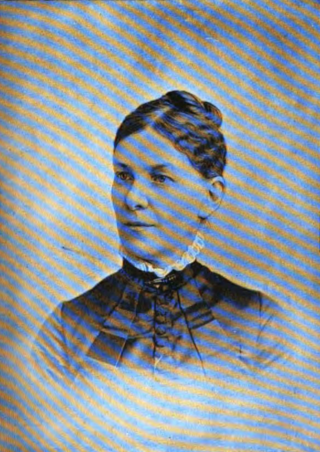
Susan Hammond Barney was an American social activist and evangelist. She was the founder of the Prisoners' Aid Society of Rhode Island, and due to her efforts, police matrons were secured for the station houses of large cities. She worked with the Woman's Foreign Missionary Society, and was the first president of the Rhode Island Woman's Christian Temperance Union (WCTU). She was instrumental in making prohibition a constitutional enactment in Rhode Island in 1886. Barney is best remembered as the WCTU's National Superintendent of Prison, Jail, Police, and Almshouse Visitation. Her wide sympathies and ministries earned her the title of "The Prisoner's Friend." It was Barney's desire to become a foreign Christian missionary, but, due to ill-health, she was not able to pursue this career; nonetheless, her first public speaking was done in the interest of the Woman's Foreign Missionary Society of the Methodist Episcopal Church.

Anna Eliza Byford Leonard was an American reformer, and the first woman appointed as sanitary inspector. She also served as president of the Woman's Canning and Preserving Company.

Jennie Kimball was an American actor, soubrette, and theatrical manager.

Clara Christiana Morgan Chapin was a British-born American woman suffragist, temperance worker, and newspaper editor.

Eva Kinney Griffith Miller was an American journalist, temperance activist, novelist, newspaper editor, and journal publisher.
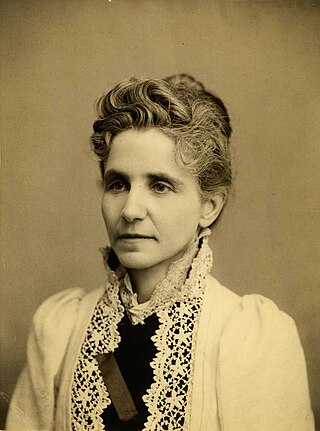
Laura M. Johns was an American suffragist and journalist. She served as president of the Kansas State Suffrage Association six times, and her great work was the arrangement of thirty conventions beginning in Kansas City in February, 1892. She also served as president of the Kansas Republican Woman's Association, superintendent of the Kansas Woman's Christian Temperance Union, and field organizer of the National American Woman Suffrage Association (NAWSA). Johns died in 1935.
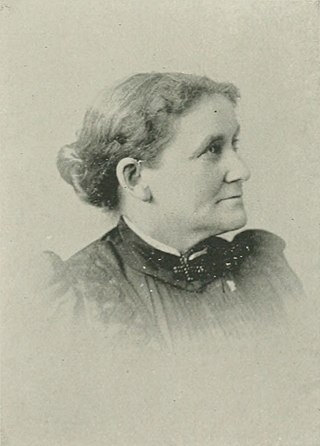
Cordelia Throop Cole was a 19th-century American social reformer, who lectured, wrote, and edited on behalf the temperance crusade and social purity movement. She made valuable contributions with her writing to the work of temperance and social purity, and frequently addressed large audiences on these subjects. She took a most conspicuous part in the temperance crusade of her state, riding many miles on her lecture trips, and sometimes holding three or four meetings at different locations within a day. In 1885, she was made the Iowa superintendent of the "White Shield and White Cross" work of the Woman's Christian Temperance Union (WCTU). She was one of the managing editors of the Dial of Progress of Mount Pleasant. Cole died in 1900.

Alice Ives Breed was an American social leader, salonnière, and clubwoman. She excelled as an organizer, using her executive abilities in religious, philanthropic, literary and social channels, aiming to improve the community.

Mary Thompson Hill Willard was an American teacher and social reformer. Her daughter, Frances Willard, was the founder and president of the World's Woman's Christian Temperance Union (W.C.T.U.) as well as president of the National W.C.T.U.

Eliza R. Sunderland was an American writer, educator, lecturer, and women's rights advocate of the long nineteenth century. She was a prolific writer for literary and religious papers and magazines. She was also prominent in her religious denomination, no woman in the country being called upon more often than Sunderland for addresses at local, state, and national Unitarian gatherings. She was one of the organizers and the first president of the Western Women's Conference. At the Parliament of the World's Religions in Chicago, in 1893, she represented the Unitarian women of the U.S. and gave one of the most notable addresses of the parliament. She was especially well-fitted to serve as a member of the board of school visitors in Hartford, Connecticut on account of her lifelong interest in school matters, her experience as a teacher, and her intellectual training.
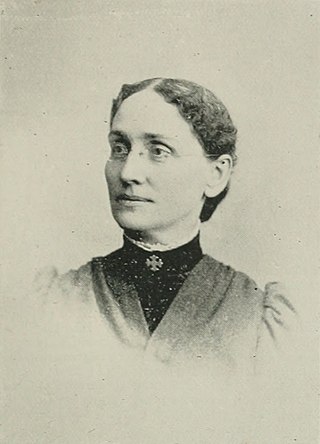
Katherine Van Allen Grinnell was an American lecturer, author, and social reformer. She was one of the first women in the United States to lecture and write on the place of woman in the scheme of government. Grinnell attained an international reputation and was praised by Frances Willard, Susan B. Anthony, Lady Somerset, and others.

Amalia Post was an American suffragist. She had been a leader in the woman suffrage movement for 25 years and was largely instrumental in having the franchise granted women in Wyoming Territory by the 1st Wyoming Territorial Legislature in 1869.
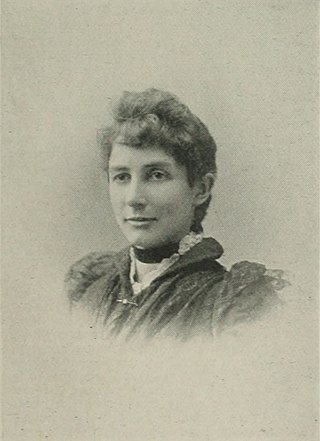
Emma Winner Rogers was an American writer and speaker upon economic and social questions, and on the Arts and Crafts movement. She favored suffrage, and served as an officer of the National American Woman Suffrage Association. Among her published works can be counted Deaconesses in the early church. Deaconesses in the modern church. (1891), The social failure of the city (1898), The Journal of a Country Woman (1912), and Why not complete the enfranchisement of women (1912).

Lelia P. Roby was an American philanthropist of the long nineteenth century. She was the founder of the Ladies of the Grand Army of the Republic. Thoroughly educated, she was a connoisseur in architecture and art, a linguist, and a well-read lawyer. She did a good deal of literary work under the pen-name "Miles Standish".




















